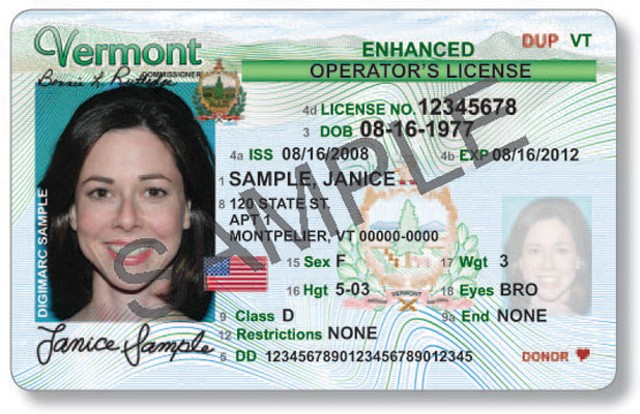Published May 27, 2009 at 8:14 a.m.
Seventeenth-century explorer Samuel de Champlain didn’t need an enhanced driver’s license to cross the U.S.-Canada border. So, it’s ironic that this summer’s celebration of the two countries’ shared history coincides with new restrictions that make it harder for modern-day adventurers to retrace Champlain’s steps.
As of June 1, getting into the United States from Canada will be tougher for everybody, as a result of the Western Hemisphere Travel Initiative, aka WHTI — part of the Department of Homeland Security’s ongoing efforts to make borders more secure after 9/11. That includes Native Americans and First Nations people of Canada, who have been relying on the Jay Treaty as a passport since 1794. Negotiated between the United States and Great Britain, the agreement allows Canadian-born people with at least 50 percent aboriginal blood to pass freely between the two countries.
Why the change? A government-issued photo ID and a copy of a birth certificate used to be enough to prove citizenship at the border. But “there are over 5000 different types of birth certificates,” says Ted Woo, the New England public affairs officer for the Department of Customs and Border Protection. “We needed a document that’s secure and not able to be easily copied.”
Of the three options available to U.S. citizens, the traditional passport is still the gold standard, as it allows you to travel by air, land or water. At $100, it’s also the most expensive. The passport card, meanwhile, costs $45 and is the size of a driver’s license.
Border-state residents of Vermont, New York, Michigan and Washington can opt instead for the enhanced driver’s license, issued by each state’s department of motor vehicles. In Vermont, it’s $65 and you have to go to Montpelier to score one. It serves as a driver’s license, which costs $40 anyway.
The passport card and EDL are embedded with a radio frequency identification tag which, like those used in EZ-Pass toll systems, is designed to reduce wait times. Everyone in the car — drivers and passengers — hold up their cards upon approaching the border. Cars still must stop at the booth, but the officer will already know who’s in the vehicle. According to Woo, the chip doesn’t contain any of the cardholder’s private information, just a number that allows the CBP system to access the person’s profile in the government database. Woo also advises that the card can’t be used to track the cardholder wherever he or she may be; it only works in close proximity to the card-reading computers at the border.
The radio frequency ID chip doesn’t sit well with Native Americans and aboriginal Canadians. Joanne Dunn, a member of the Mi’kmaq tribe of Canada, is the director of the North American Indian Center of Boston and has been using her Certificate of Indian Status — also called a band card — to enter the U.S. as long as she can remember. The Mi’kmaq number around 40,000 and inhabit much of the land along the Canadian border with Maine. “The Mi’kmaq have been going back and forth across the border since time immemorial,” she says. “I know people who walk back and forth to visit an aunt or an uncle on the other side. They walk over to have tea.”
The Mi’kmaq also cross the border in the summer to harvest blueberries in Maine, a practice that fulfills a cultural need as much as a financial one. “I’ve had calls now from bands on the Canadian side, and they’re panicking because they want to make sure they can get back,” Dunn relates.
Margot Geduld, the spokesperson for Indian and Northern Affairs Canada, says the current Indian Status card will be accepted by Canadian border guards until her department introduces the new enhanced security cards this summer. Since the Western WHTI is a U.S. law, Geduld is more concerned about First Nations people of Canada being able to visit their neighbors to the south.
Woo assures that it won’t be a problem, saying that the U.S. “will continue to accept a photo ID tribal card on June 1, 2009, and there will be a modest but reasonable transition period for the new WHTI-compliant card.”
For all travelers seeking entry to the U.S. via car, Woo has this advice: Have your WHTI document ready to present to the CBP officer, declare anything you acquired in Canada, “and just answer the questions and it will be an easy travel through” — three hassles Champlain was spared when he crossed into “Vermont” on the lake in 24 canoes equipped with Native American guides.
More By This Author
Speaking of...
-

John Douglas Makes Art From Antiviolence
Sep 28, 2016 -

Burlington Police Face Pushback on Homeland Security Partnership
Mar 15, 2016 -

At the Junction of State and Federal Law, I-91 Checkpoint Becomes Site of Legal Collision
Feb 5, 2014 -

Maple Makeover? Vermonters Discover a New Sugaring Technique
Feb 5, 2014 -

Disharmony on Prospect Street: A Dispute Between Neighbors Strikes a Sour Note
Feb 5, 2014 - More »
Comments
Comments are closed.
From 2014-2020, Seven Days allowed readers to comment on all stories posted on our website. While we've appreciated the suggestions and insights, right now Seven Days is prioritizing our core mission — producing high-quality, responsible local journalism — over moderating online debates between readers.
To criticize, correct or praise our reporting, please send us a letter to the editor or send us a tip. We’ll check it out and report the results.
Online comments may return when we have better tech tools for managing them. Thanks for reading.














































